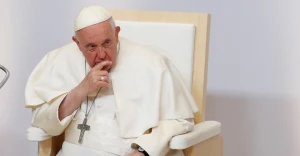
When will the war end?
I started to hear this question very rarely, although in the first months it was perhaps the most popular
For me, this is evidence of the extraordinary strength of our people. We are proud of the Armed Forces, but we should be proud of our entire nation, which demonstrates tremendous strength of spirit. The fact that people are asking less and less about the end of the war means that we have accepted one option for ourselves: only victory. And time does not matter.
But, as an analyst, I want to share with you my thoughts on when the war might end. So, the last few weeks have witnessed a number of events that, in my opinion, give grounds to draw conclusions about the end of the war.
-
The occupiers brought the 3rd Army Corps to the frontline. Contrary to their plans, this did not lead to any change. They gave birth to this corps all over Russia, however, they had high hopes, but little results. It is clear that it will be even more difficult for them to form new corps than this 3rd Corps, which has not solved anything. In fact, the efforts to create new forces in Russia are heading for zero. And all their new battalions will only replace the tattered and broken ones.
-
The shelling has seriously decreased. We are hiding less frequently due to air alert, Kalibrs are launched very rarely, and various Kh- and Onyx have become less frequent. The phenomenon of the "shaft of fire" has almost disappeared at the frontline. All this is evidence of the exhaustion of missile and artillery resources. No, they have not run out yet and will not run out. But the enemy is forced to use them sparingly, as it realizes that it will not be able to replenish their stocks in the long term. At the same time, we will receive German and Norwegian air defense systems by the end of the fall.
-
Russia has stopped Nord Stream 1 and is reducing gas supplies to the EU. This is perhaps one of the most important news. We have often had to doubt the reliability of our partners and their willingness to endure inconveniences. Now Putin has once again stepped in and left Europeans with no choice but to look for a way to do without Russian gas for good. Let me remind you that the EU consumed 83% of Russian gas.
These factors seriously affect how the war will unfold.
I distinguish two scenarios: optimistic and pessimistic.
The optimistic scenario assumes that in the spring we will see many gestures of "goodwill" and the beginning of the negotiation process. This will be accompanied by the cessation of hostilities and the withdrawal of Russian troops from a number of occupied territories. The peace talks will be completed approximately in May. The formula will be as follows: Russia will give up its demands for denazification and the recapture of Donbas, and will take on the responsibility of rebuilding Ukraine with sanctions lifted. Ukraine will refuse to join NATO. Donbas and Crimea will not be discussed.
“The optimistic scenario assumes that in the spring we will see many gestures of "goodwill" and the beginning of the negotiation process”
The main condition for this scenario is that sanctions, which will come into force in December, cause significant damage to Russian oil exports. This will be possible, among other things, if India and China change their position on the purchase of Russian energy resources. If in January Putin sees that his financial prospects are on the verge of bankruptcy, waging war will begin to lose its meaning. After all, this fall he will be pouring money into the social sector to keep the support for the “special military operation.” Pouring money into social programs and waging war means earning tons of money.
“Pessimistic scenario. China and India will support Putin, and he will be fine financially. But this support will not last long”
Pessimistic scenario. China and India will support Putin, and he will be fine financially. But this support will not last long, as a serious global economic recession will begin in the spring, and energy prices will still fall. Putin will use the winter to maximize the accumulation of new forces and throw them into battle in March or April. These forces will not be able to show results, but intense fighting will continue until July or August, until the situation of this year is repeated. Then Putin will have to make gestures of goodwill and sit down at the negotiating table, which will end around October.
So, optimistically, May, pessimistically, October.
About the author. Viktor Andrusiv, political and public figure, analyst and publicist.
The editorial staff do not always share the opinions expressed by the blog authors.
- News













































